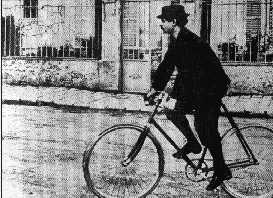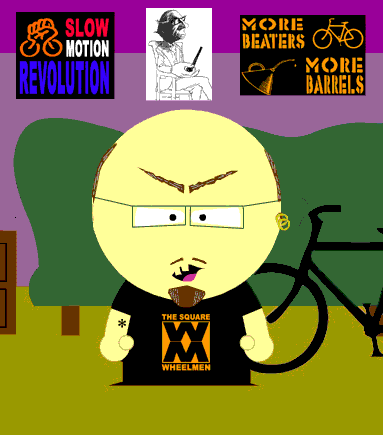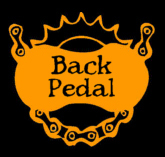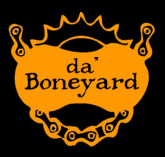31.8.08
30.8.08
29.8.08
28.8.08
that which rolls
rolls again
with cyclealities
with cyclealities

 That's what gentlemen cyclists used to call the accessories (bells, lamps, cyclometers, pumps, bags, racks, etc., etc.) with which they adorned their lightweight steeds. Birmingham based Lucas Industries was perhaps the greatest manufacturer of cyclealities. Founded in 1872 by "King of the Road", Joseph Lucas, the lamp and oil company took advantage of the late 19th bike craze by producing bike lamps.
That's what gentlemen cyclists used to call the accessories (bells, lamps, cyclometers, pumps, bags, racks, etc., etc.) with which they adorned their lightweight steeds. Birmingham based Lucas Industries was perhaps the greatest manufacturer of cyclealities. Founded in 1872 by "King of the Road", Joseph Lucas, the lamp and oil company took advantage of the late 19th bike craze by producing bike lamps. Though the dominant cyclealities company in Britain, Lucas never fully caught on in the US. The King of the Road was widely known as the Prince of Darkness after initial supply problems led to the rumor that that Lucas-equipped cars were electrically faulty.
Though the dominant cyclealities company in Britain, Lucas never fully caught on in the US. The King of the Road was widely known as the Prince of Darkness after initial supply problems led to the rumor that that Lucas-equipped cars were electrically faulty.
But any self-resting British lightweight restoration is utterly incomplete without those little extras.

Fork-mounted lights, rather than the more common stem-mounted versions, provide excellent visibility of the roads and streets.

Water bottles and victuals jugs keep your sustenance handy.

And where else would you store
your touring books and maps?
your touring books and maps?
Labels: books, history, rolling abroad
27.8.08
The ultimate renewable resource:
Youth!
Avila Chicago: Making a Difference will air my recent interview on Comcast Chicago Access Network TV, Channel 19, Friday, 5 September at 5pm and again on Sunday, 7 September at 12 noon.
Labels: Chicago, enviromatters, worldbeat
26.8.08
Outing
the original
biker zine
biker zine
 Well before it meant something different altogether, Outing was THE mag for the active British gentleman. It covered a wide range of sporting activities, including biking, during the late 19th and early 20 centuries. First published in 1882 under the title of the Wheelman; it went through four title changes before ceasing publication in 1923. But it never strayed far from it's original mission:
Well before it meant something different altogether, Outing was THE mag for the active British gentleman. It covered a wide range of sporting activities, including biking, during the late 19th and early 20 centuries. First published in 1882 under the title of the Wheelman; it went through four title changes before ceasing publication in 1923. But it never strayed far from it's original mission:
 Outing was also popular here in the US; prossibly because of our slavish Anglophilia during the Gilded Age. It attracted the best American authors and illustrators. Jack London's White Fang was serialized in from May through October, 1906. And Frederic Remington, having lost his inheritance, did many of its illustrations.
Outing was also popular here in the US; prossibly because of our slavish Anglophilia during the Gilded Age. It attracted the best American authors and illustrators. Jack London's White Fang was serialized in from May through October, 1906. And Frederic Remington, having lost his inheritance, did many of its illustrations. Thomas Stevens, the first to circle the globe on a bike, also serialized his adventures. I originally came across Outing while I was looking for articles on winter biking. GoogleBooks coughed up a number of issues featuring Alfred C. Stokes, biologist and erstwhile biker from Britain. He must have been a regular contributor since I found articles on topics ranging from quick road repairs to the joys of winter biking.
Thomas Stevens, the first to circle the globe on a bike, also serialized his adventures. I originally came across Outing while I was looking for articles on winter biking. GoogleBooks coughed up a number of issues featuring Alfred C. Stokes, biologist and erstwhile biker from Britain. He must have been a regular contributor since I found articles on topics ranging from quick road repairs to the joys of winter biking.IT IS NOT A DREAM A BICYCLING SKETCH ... Winter riding is not pleasant in spite of the assertions to the contrary of some that must be thinking of the fragrant and sunny South where the bicyclist has the year on his string and may play it and do with it as he pleases. But to us of the North when the heavy sky comes clown and covers us with its chill winter riding is not pleasant.
There are I believe reformed cyclists who have written confessions in which they tell us who are not reformed that when under the best conditions they have seemed to be gliding smoothly and with little effort every joint has been rattling and every tooth leaping in its socket I think that unless the reformed were telling lies they had been experimenting with winter riding when the roads...
It is better to light the fire and your pipe put your feet on the mantelpiece and travel the summer roads in a mental vision. In the curling smoke you may see the summer adventures and hear the summer sounds.
Then we can dream about the time when the cyclist with loving care wheels the machine through the alley and out of the front gate with a wicked wish that someone might be envying him his good luck in possessing such a treasure.
He is not conceited nor self conscious beyond the majority of his fellows but you remember the beginning of a certain rider's career when he tried to seem bold while his heart was making a lump in his throat with fear of a disaster and his hands grasped the vulcanite with frantic clutch. But that passes.
The time always comes when the wheelman is like that classic woodchuck that sat under the tree where he cared for nobody and nobody cared for he. Then cheerfully he rides with holes in his knickerbockers a hat down over his ears and shoes that have seen better days.
Labels: history, rolling abroad, writing
25.8.08
You are here
a Surrealist Map
of the World
of the World
 A la Alfred Jarry, Surrealists in Belgium (re)imagined the world not along the lines of patriotic nationalism. Rather they made the point that where it dominates, ultimately all human intimacy is lost to power and profit. I wonder what the CBF Chicago Street Map would look like along similar lines?
A la Alfred Jarry, Surrealists in Belgium (re)imagined the world not along the lines of patriotic nationalism. Rather they made the point that where it dominates, ultimately all human intimacy is lost to power and profit. I wonder what the CBF Chicago Street Map would look like along similar lines?
Even more than patriotism – which is a quite commonplace sort of hysteria, though emptier and shorter-lived than most – we are disgusted by the idea of belonging to a country at all, which is the most bestial and least philosophic of the concepts to which we are all subjected... Wherever Western civilization is dominant, all human contact has disappeared, except contact from which money can be made – payment in hard cash.
Surrealist map of the world. (From Vanetes, Brussels, June 1929), p.183.
Labels: rolling abroad, Situationists, that which rolls
24.8.08
Bikes Belong in politics
bike-partisans
roll the conventions
roll the conventions
 The Denver-based bike advocacy group is partnering with Humana to provide 1,000 bikes for the Democratic National Convention in Denver, Colorado, August 25-28. Being non-partisan, the partnership will provide another 1,000 at the Republican National Convention in St. Paul and Minneapolis, Minnesota, September 1-4.
The Denver-based bike advocacy group is partnering with Humana to provide 1,000 bikes for the Democratic National Convention in Denver, Colorado, August 25-28. Being non-partisan, the partnership will provide another 1,000 at the Republican National Convention in St. Paul and Minneapolis, Minnesota, September 1-4. The goal is to encourage bike riding officials, delegates, volunteers, and journalists. Bikes Belong and Humana believe that the bikes will promote short trips between hotels, convention centers, restaurants, and the convention arenas. With an estimated 10,000+ participants for each convention, they hope that the presidential candidates themselves will develop a greater appreciation and respect for the role of biking in the US.
The goal is to encourage bike riding officials, delegates, volunteers, and journalists. Bikes Belong and Humana believe that the bikes will promote short trips between hotels, convention centers, restaurants, and the convention arenas. With an estimated 10,000+ participants for each convention, they hope that the presidential candidates themselves will develop a greater appreciation and respect for the role of biking in the US.Labels: Election 08, new urbanism, velotariat
23.8.08
What's better than a slinky
& saves you $$$?
back to school
w/Halle Miroglotta
w/Halle Miroglotta
 Over at the Loyola University Examiner, the sociology student and activist is starting a series of articles to honor the final month of Bike Chicago 2008. Her articles will focus on local bike shops, Chicago Critical Mass, and the new Loyola University Bike Initiative. She also has a few tips for would-be bikers.
Over at the Loyola University Examiner, the sociology student and activist is starting a series of articles to honor the final month of Bike Chicago 2008. Her articles will focus on local bike shops, Chicago Critical Mass, and the new Loyola University Bike Initiative. She also has a few tips for would-be bikers.1.Stay visable- the law requires you to have a front headlight. And, while not required, rear blinking lights are a great way to increase your visability and safety.
2. Obey the rules of the road. Bikes are vehicles- you are required to stop at stop signs, obey traffic patterns, and yield to pedestrians.
3. This is a given- wear a helmet!
4. Know your bike- regularly check your air pressure, brakes, and chain in order to ensure the safest possible ride.
5. Know your rights- motorists are required to pass with at least three feet of room.
Labels: Chicago, velotariat, writing
22.8.08
21.8.08
The Pushbike song
by
The Mixtures
The Mixtures
This is a video made in 1970 by the Australian band. It depicts the band and friends riding through the streets of Melbourne. Filmed in black and white (due to Australian Television having no colour broadcasts at that time), it was notable for scenes involving a procession of bikes (including a penny farthing and rollerskaters) on a busy six-lane Melbourne arterial road, and a scene of four members of the band riding a tandem bike atop a car transporter travelling at speed across a bridge.

Ridin' along on my pushbike, honey.
When I noticed you.
Ridin' downtown in a hurry, honey,
Down South Avenue.
You looked so pretty as you were ridin' along.
You looked so pretty as you were singing this song.
Well, I put on the speed,
And I tried catching up,
But you were pedaling harder too.
Ridin' along like a hurricane, honey,
Spinning out of view.
You looked so pretty as you were ridin' along.
You looked so pretty as you were singing this song.
Sing a song!
A-round, round, wheels goin' round round round.
Down up pedals, down up down.
But I gotta get across to the other side of town,
Before the sun goes down. Hey, hey!
Now we're riding along on the bicycle, honey.
That's a bicycle built for two.
A-lookin' at my honey in the rearview mirror;
Now I got a better view.
You looked so pretty as you were ridin' along.
You looked so pretty as you were singing this song.
Sing a song!
A-round, round, wheels goin' round round round.
Down up pedals, down up down.
But I gotta get across to the other side of town,
Before the sun goes down. Hey, hey
When I noticed you.
Ridin' downtown in a hurry, honey,
Down South Avenue.
You looked so pretty as you were ridin' along.
You looked so pretty as you were singing this song.
Well, I put on the speed,
And I tried catching up,
But you were pedaling harder too.
Ridin' along like a hurricane, honey,
Spinning out of view.
You looked so pretty as you were ridin' along.
You looked so pretty as you were singing this song.
Sing a song!
A-round, round, wheels goin' round round round.
Down up pedals, down up down.
But I gotta get across to the other side of town,
Before the sun goes down. Hey, hey!
Now we're riding along on the bicycle, honey.
That's a bicycle built for two.
A-lookin' at my honey in the rearview mirror;
Now I got a better view.
You looked so pretty as you were ridin' along.
You looked so pretty as you were singing this song.
Sing a song!
A-round, round, wheels goin' round round round.
Down up pedals, down up down.
But I gotta get across to the other side of town,
Before the sun goes down. Hey, hey
Labels: kunst, rolling abroad, velotariat
18.8.08
The better world club
Ohio boys
make good
make good

There's finally a roadside assistance program for us bikers. Available from Better World Club, it provides service up to 30 miles with a maximum of two service calls per covered member per year. You also get League of American Cyclists membership as well as discounts/special offers on travel and cycling products.
Labels: enviromatters, traffic taming, velotariat
17.8.08
Heren fietsers
gentleman cyclists
across the Channel
across the Channel

Over at Flickr, mdavid2000 has a load of fine shots I'm assuming are from locations in The Netherlands. This one shows an unidentified young lady with Jo Mark and Sander. They're obviously an urban(e) alternative to their tweedy confederates in Merry Ole England.
%-{)>
Labels: history, kunst, rolling abroad
16.8.08
As the wrench turns

A gentleman cyclist with any sense of style would definitely appreciate this project posted over at Instructables, the King of DIY sites. I've got an old leather briefcase I got in Germany many moons ago. I'll let you know how it turns out!
Labels: history, kraftwerk, that which rolls
15.8.08
14.8.08
12.8.08
More words

We can ask the question: Did Misha [Saakashvili] go too far or get pulled into a trap? But it really makes no difference right now. Russia has just declared the 'post-Soviet era' over and a new age has begun.Thomas Goltz
• The US and several European nations have begun to evacuate hundreds of their citizens from Georgia
Labels: Georgia, war stories, worldbeat
11.8.08
Forgotten in war
Old Man at the Bridge
Ernest Hemingway
1938
Ernest Hemingway
1938
 70 years ago, this summer, the famous war journalist and author wrote this short story about the refugees caught between two armies in the Spanish Civil War. Last weekend's Russian attack on Georgia should not distract us from this new war's new refugees.
70 years ago, this summer, the famous war journalist and author wrote this short story about the refugees caught between two armies in the Spanish Civil War. Last weekend's Russian attack on Georgia should not distract us from this new war's new refugees.An old man with steel rimmed spectacles and very dusty clothes sat by the side of the road. There was a pontoon bridge across the river and carts, trucks, and men, women and children were crossing it. The mule-drawn carts staggered up the steep bank from the bridge with soldiers helping push against the spokes of the wheels. The trucks ground up and away heading out of it all and the peasants plodded along in the ankle deep dust. But the old man sat there without moving. He was too tired to go any farther.
It was my business to cross the bridge, explore the bridgehead beyond and find out to what point the enemy had advanced. I did this and returned over the bridge. There were not so many carts now and very few people on foot, but the old man was still there."Where do you come from?" I asked him.That was his native town and so it gave him pleasure to mention it and he smiled.
"From San Carlos," he said, and smiled."I was taking care of animals," he explained.He did not look like a shepherd nor a herdsman and I looked at his black dusty clothes and his gray dusty face and his steel rimmed spectacles and said, "What animals were they?"
"Oh," I said, not quite understanding.
"Yes," he said, "I stayed, you see, taking care of animals. I was the last one to leave the town of San Carlos.""Various animals," he said, and shook his head. "I had to leave them."I was watching the bridge and the African looking country of the Ebro Delta and wondering how long now it would be before we would see the enemy, and listening all the while for the first noises that would signal that ever mysterious event called contact, and the old man still sat there."What animals were they?" I asked.He looked at me very blankly and tiredly, and then said, having to share his worry with someone, "The cat will be all right, I am sure. There is no need to be unquiet about the cat. But the others. Now what do you think about the others?"
"There were three animals altogether," he explained. "There were two goats and a cat and then there were four pairs of pigeons."
And you had to leave them?" I asked.
"Yes. Because of the artillery. The captain told me to go because of the artillery."
"And you have no family?" I asked, watching the far end of the bridge where a few last carts were hurrying down the slope of the bank.
"No," he said, "only the animals I stated. The cat, of course, will be all right. A cat can look out for itself, but I cannot think what will become of the others."
"What politics have you?" I asked.
"I am without politics," he said. "I am seventy-six years old. I have come twelve kilometers now and I think now I can go no further."
"This is not a good place to stop," I said. "If you can make it, there are trucks up the road where it forks for Tortosa."
"I will wait a while," he said, " and then I will go. Where do the trucks go?"
"Towards Barcelona," I told him.
"I know no one in that direction," he said, "but thank you very much. Thank you again very much.""Why they'll probably come through it all right."There was nothing to do about him. It was Easter Sunday and the Fascists were advancing toward the Ebro. It was a gray overcast day with a low ceiling so their planes were not up. That and the fact that cats know how to look after themselves was all the good luck that old man would ever have.
"You think so?"
"Why not," I said, watching the far bank where now there were no carts.
"But what will they do under the artillery when I was told to leave because of the artillery?"
"Did you leave the dove cage unlocked?" I asked.
"Yes."
"Then they'll fly."
"Yes, certainly they'll fly. But the others. It's better not to think about the others," he said.
"If you are rested I would go," I urged. "Get up and try to walk now."
"Thank you," he said and got to his feet, swayed from side to side and then sat down backwards in the dust.
"I was taking care of animals," he said dully, but no longer to me. "I was only taking care of animals."
Labels: Georgia, pensées, war stories
10.8.08
How to murder a small country
and get away
with it
with it

(A Russian convoy outside the village of Dzhaba in South Ossetia. Prime Minister Vladimir V. Putin of Russia declared that war has started.)*Motive
Claim that the country to be invaded is oppressing a minority population, preferably located along a shared border.
Example: Nazi invasion of Poland,
3 September 1939

(A Russian mobile artillery unit fired toward a Georgian position outside Dzhava on Saturday.)Opportunity
Choose a time of the year when the attention of the world is otherwise occupied or in late summer/early fall when journalists are usually on vacation.
Example: Japanese invasion of China,
7 July 1937

(Russian air attacks struck two apartment buildings in Gori in what an official at the Georgian Interior Ministry called a major escalation.)Means
Take advantage of other great powers' fears that their involvement could escalate the invasion into a broader regional war.
Example: Soviet invasion of Czechoslovakia, 21 August 1968

(One Georgian soldier, his face a mask of exhaustion, cradled a Kalashnikov. We killed as many of them as we could, he said. But where are our friends?)
* Excerpts and photos from the NYTimes.
Labels: Georgia, history, war stories
8.8.08
Garrison Keillor speaks out
on
Obama & McCain
Obama & McCain
 Over at Salon, the Prairie Philosopher opines on our amazing country where an Arizona multimillionaire can attack a Chicago South Sider as an elitist and hope to make it stick. Typically rambling and always insightful, Keillor writes:
Over at Salon, the Prairie Philosopher opines on our amazing country where an Arizona multimillionaire can attack a Chicago South Sider as an elitist and hope to make it stick. Typically rambling and always insightful, Keillor writes:And it's an amazing country where an Arizona multimillionaire can attack a Chicago South Sider as an elitist and hope to make it stick. The Chicagoan was brought up by a single mom who had big ambitions for him, and he got scholarshipped into Harvard Law and was made president of the law review, all of it on his own hook, whereas the Arizonan is the son of an admiral and was ushered into Annapolis though an indifferent student, much like the Current Occupant, both of them men who are very lucky that their fathers were born before they were. The Chicagoan, who grew up without a father, wrote a book on his own, using a computer. The Arizonan hired people to write his for him. But because the Chicagoan can say what he thinks and make sense and the Arizonan cannot do that for more than 30 seconds at a time, the old guy is hoping to portray the skinny guy as arrogant.
Good luck with that, sir.
Labels: books, Election 08, pensées
























